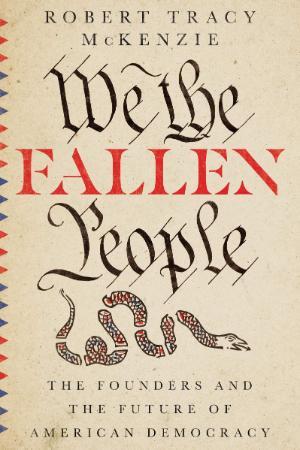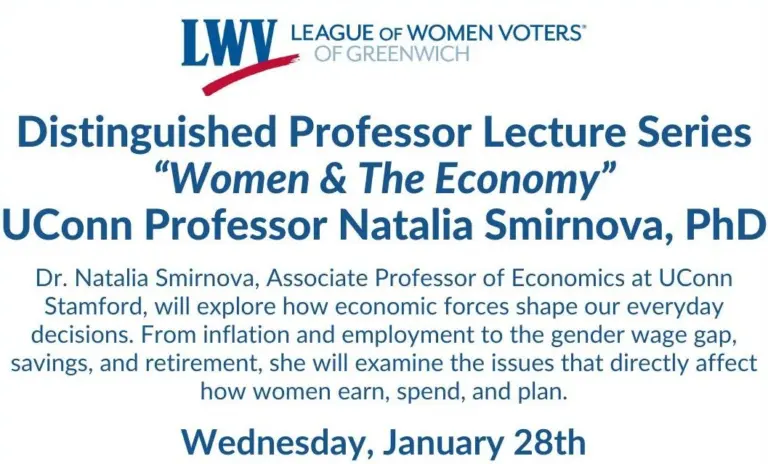By The Rev. Nathan Hart
 Dr. Tracy McKenzie, a History professor at Wheaton College in Illinois, has written a new book entitled We the Fallen People: The Founders and the Future of American Democracy. I was so interested in the subject of this book that I invited Dr. McKenzie to speak at Stanwich Church on Friday, October 28, as part of our “Christ and Culture” series. “Christ and Culture” is designed as a platform in which we can explore how to remain faithful to our Christian calling in a rapidly changing world.
Dr. Tracy McKenzie, a History professor at Wheaton College in Illinois, has written a new book entitled We the Fallen People: The Founders and the Future of American Democracy. I was so interested in the subject of this book that I invited Dr. McKenzie to speak at Stanwich Church on Friday, October 28, as part of our “Christ and Culture” series. “Christ and Culture” is designed as a platform in which we can explore how to remain faithful to our Christian calling in a rapidly changing world.
Ahead of his visit, Pastor David Borden and I interviewed Dr. McKenzie on our podcast. Here is an abridged transcript of that conversation:
Nathan: Instead of writing a book about whether the U.S. is either exceptional or terrible, which are the two prevailing narratives from our culture, you’re really trying to ask the question, how did the Founding Fathers understand the basic nature of humanity when they formed the democracy?
Tracy: Correct. I’m definitely not trying to make a political argument. I’m not trying to get readers to cast their votes in one particular way or another. I’m really concerned about American democracy, but I’m more concerned, even, about the testimony of the church in this moment. Because of that, I just long to see Christians think more “Christianly” about the way that they engage in the public square.
David: Before the writing of the Constitution, there were the Articles of Confederation. Why did that not go well? What was the mistake there with that document?
Tracy: That’s a great question. The mistake that the individuals who crafted it made, at least in the view of the authors of our Constitution, was that they’d had too high a view of human nature. They had basically assumed that you could just try to define what is a common good that everyone would recognize as something to aspire to, and then people would voluntarily sacrifice their own interests to promote the general welfare. So, they basically expected the government to work entirely on cooperation, not coercion. So there was no ability to tax individuals directly. There was no ability to regulate commerce or to draft people into the military. Everybody was just going to volunteer. They would volunteer their time and their money and so forth, and it didn’t work.
From our perspective, perhaps that’s not surprising. But what is interesting and important is that the framers of the Constitution absolutely thought it didn’t work because of that understanding of human nature. It was an unrealistic understanding. So men like George Washington, who is basically the chair of the Constitutional Convention, said that their mistake was to think too highly of human nature. We will have to take human nature as we find it. That’s the way he put it. That was the big mistake they were trying to correct. They thought they’d been idealistic, unrealistic about human motivation.
Nathan: I remember being a kid and learning in church about total depravity, the sinfulness of humanity. Then I would hear politicians make their speeches, and they would call upon “the good of the American people.” I remember being confused about which was correct: It’s either what I’m learning in church, where people are sinful, or it’s what I’m hearing from the politicians, that we’re basically good. Can you help me understand this?
Tracy: What a wonderful question. The kinds of rhetoric that you’re describing that you grew up hearing from politicians is something that would’ve been absolutely foreign to the generation of the Founders. It’s something that comes into being in the early 19th century.
The Founders, pinning down their exact personal religious convictions is not easy, but they did speak very publicly about their understanding of human nature. They described it pretty consistently. They basically said that the motive that predominates above all is always self-love or self-interest, that we are fundamentally selfish beings. They didn’t argue that people were absolutely as evil as it was possible for it to be. They just argued that, in most cases, almost all, that self-interest is somehow at the heart of what motivates us. Of course, I think that’s very reconcilable with the sort of Reformed theology that you said you were hearing in your churches because individuals like Calvin and Luther would say even when we’re doing things that are ostensibly sacrificial or noble in some way, we’re probably really motivated by self-interest, for some sort of reward that we hope to gain from God or from our neighbor.
The framers would’ve said that when it comes to hoping that people will all voluntarily deny their own interest in order to promote the common good, that we’re really deluding ourselves. That’s not going to happen. So, they held this really complex understanding that we’ve totally lost.
Two things [were understood] simultaneously: one was that if you live in a genuinely free society, the majority has to ultimately have its way. If the majority is not having its way, you don’t live in a really free society. But the other thing they believed simultaneously was that because we’re all selfish, the majority will not automatically pursue justice for our neighbors. So, we have these two things going on at the same time. The majority must prevail, and the majority might be unjust. Not always. But it very much could be unjust. So, they created the Constitution with that in mind. All of the things that you are exposed to in junior high civics about the three branches and the checks and balances, all these things, they only make sense if we understand that the framers believed we have to let the people ultimately rule, but they’re not always going to pursue the just outcome. So, we want to complicate, [or] gum up the work, slow down the process in the hope that, all things equal, more just outcomes would be the result.
To put it in more Christian terminology, I think they believed that the Fall touched everything. It would leave its mark on every institution that humans could devise.
When we think Christianly about government, we never want to let ourselves have faith in government. I make a distinction between hope for and faith in. Hope for democracy, for example, is very different than faith in democracy.
Nathan: What’s great about that position is it puts salvation back where it belongs, it puts salvation in God’s hands. Our faith is in Christ. The way our democratic system is set up might be the best of all possible options in human history. But it’s not what we put our faith in, ultimately. So for a democracy to really work, you need strong churches; you need people who really have faith, and you need people to have their faith in the right place, and then democracy will function in a better way.
Tracy: That’s correct.
Nathan: I would imagine you receive criticism from the Left and from the Right about your book. Is the criticism from the Right about why you did write a book called “We the Fallen People” when you could have written a book about the greatness of America?
Tracy: Well, first of all, I would say I was talking about the greatness of America, and I was emphasizing something very positive about the Founders, which is, I think in a way that politicians for generations since then have not, they actually understood human nature in the way that I think scripture describes it to us. I think part of the greatness of their legacy to later generations was exactly that, that they thought no government would long flourish that was not consistent in some logical way with human nature, and that an accurate understanding of human nature had to take into consideration human selfishness.
So I mean, you could listen to that and say, “Well, that’s very negative.” But I’m actually trying to make the argument that in a way that, tragically, I think a lot of 21st century Christians don’t immediately see, the Founder’s understanding of human nature was truer to scriptural revelation than what we hear just from all directions in the public square today.
Nathan: Does the criticism from the Left go like this? “You’re talking about the fallenness of the American people. Why not focus more on America’s original sin, slavery? Why not talk about racism?”
Tracy: Yeah. That’s a great question. I’ve thought about that as I was writing. I wanted to push back against the argument that because the founding generation did not see exactly what we see, they don’t have something to say to us. C.S. Lewis once put that we really need something to judge our own moment in time other than our immediate present. He says that we don’t have the future yet, so really all we’re left with is the past. And so we really need to study the past. He said that it’s not dangerous because where they have blind spots, we will see those blind spots and we will not be corrupted by them. But they will often have insights that we lack. In other words, their blind spots are not our blind spots.
So, calling attention to what I think everyone in 2022 would say was a blind spot of the late 18th century would be a true statement, but doesn’t do the sort of thing that really deeply challenges us to reexamine our own hearts in a certain way.
The thing that I was really wanting to push on more than anything else was the understanding of human nature. I did actually [write] some about Native American removal, and no one of course would defend that today… The way that I approach moral questions like this, whether it’s slavery or Native American removal or other sorts of things that strike us as obviously unjust today, is to start out with the parable that Jesus gives in Luke 18. This is the parable where he tells us that two men go into the temple to pray. One is the Pharisee. He says, “Father, I thank you I’m not like others.” And the other is the tax collector, who will not even raise his head but just beats his breasts, says, “Father, have mercy upon me.” I like to think that every time we study any moral question in the past, we are always in the position of choosing. We’re either going to say, “Lord, I’m so thankful I’m not like other men are.” Or, we need to be able to say, “Lord, have mercy.”
The great danger, I think, in focusing so much on issues of race and slavery is that I think it rarely evokes the, “Father, have mercy on me because I would’ve done the exact same thing,” and tends to bring out the, “I’m so thankful that I’m not like other men are,” and that’s not where I wanted to leave our readers.
Here’s one thing I’m pretty absolutely adamant about: that Christ-infused thought never puffs us up or promotes arrogance. Christ-infused thought reinforces our sense of self as recipients of mercy who desperately need it.
David: I just find it interesting because you’re expressing in your book the antidote, I think, to the pride on both the left and the right. The reason why the Founding Fathers are so great is because they knew that they weren’t.
Tracy: Isn’t a lot of Scriptural teaching that way? “He who exalts himself will be humbled. He who humbles himself will be exalted.” The first beatitude: “Blessed are the poor in spirit.” The moment I have this sense of deep spiritual need, Jesus says I’ll be the recipient of blessing. Whatever the mindset of the framers, I’m not arguing that they were always quoting chapter and verse in the way that they thought, but I’m just so impressed by how consistent their understanding of human nature was with biblical teaching. I do think there is that paradox: By acknowledging our fallenness, they actually can promote a system more likely to promote just outcomes than not.
To explore these themes further, feel free to join me and Dr. McKenzie at Stanwich Church on Friday, October 28. There will be an optional dinner at 6:30 PM followed by the talk and discussion in the Sanctuary at 7:00 PM. The event is free to the public.
The Rev. Dr. Nathan Hart is the Senior Pastor of Stanwich Church.




